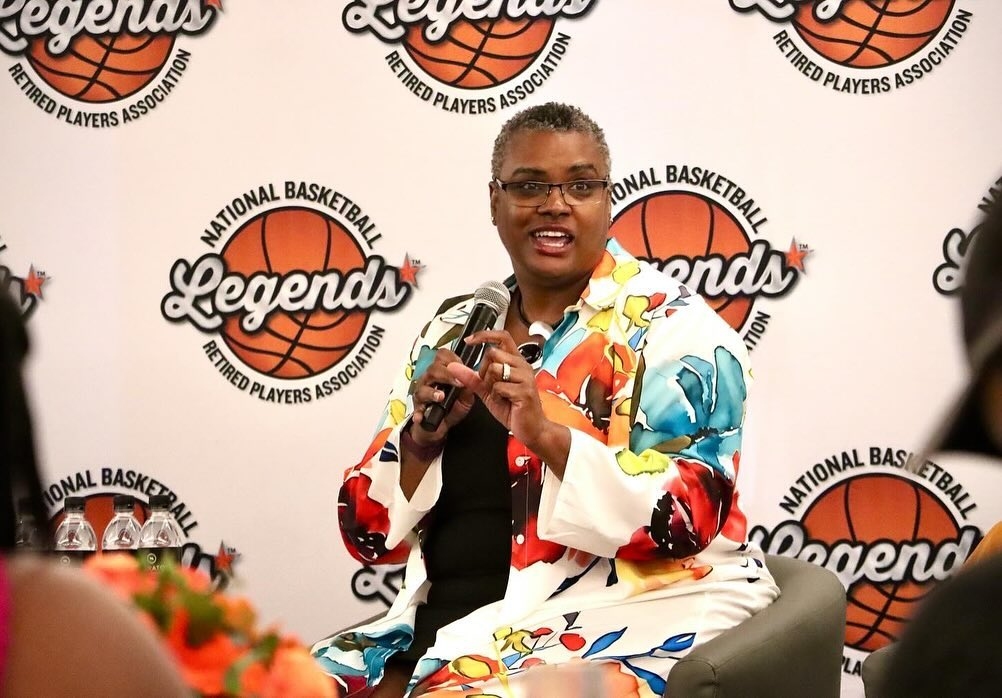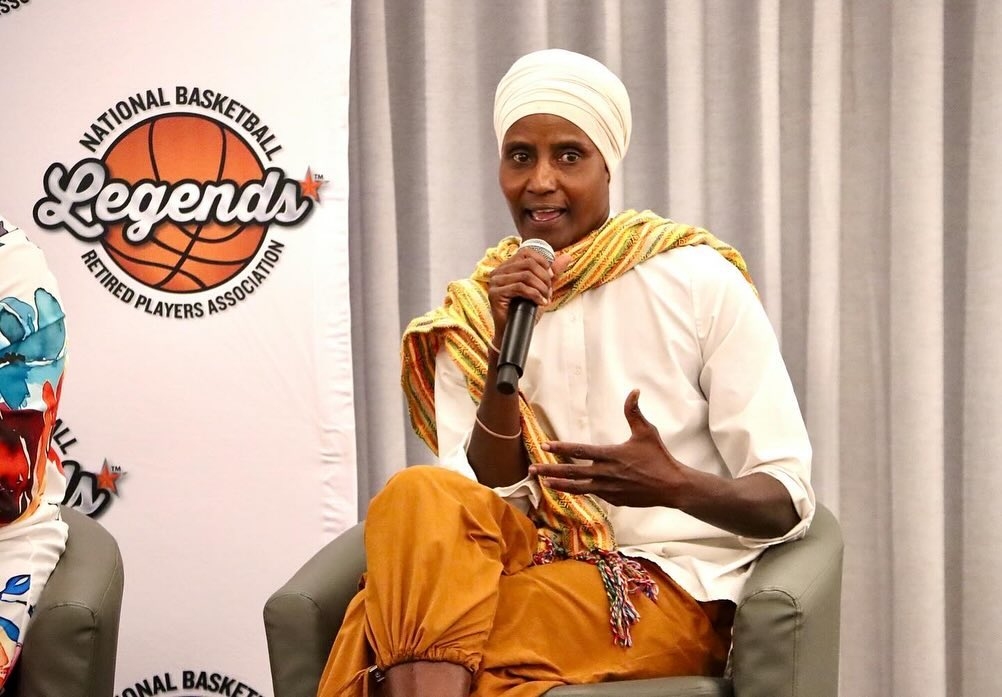
WNBA All-Star Weekend had a different vibe to it this year. Amid the biggest surge in popularity the league has seen, the W took its premier event to new heights. We saw one of the most expansive WNBA Live activations ever. A 3×3 competition was added to the Friday night lineup. The Team USA vs. Team WNBA formula provided us with perhaps the greatest All-Star game in league history. A lot was happening and the energy was palpable. But amidst all the fun and excitement, my favorite event had a more serious tone. Rushia Brown hosted a brunch and panel discussion focusing on the mental, financial, and physical wellness of women’s basketball players and how to secure information and resources to positively contribute to their well-being in those areas. Former players Anita Maxwell, Leslie Johnson, and Bridget Pettis shared their powerful personal journeys and how they came to find themselves as they transitioned from the court to their post-playing days.
After introductions, Leslie Johnson started off the panel with a powerful telling of her journey from collegiate star athlete to her battles with alcoholism and depression to ultimately regaining control of her life. While being a professional athlete is hard regardless of the sport, women’s basketball players have unique challenges they must endure on their path. There is the uncertainty that most of these ladies will have to deal with due to the limited opportunities at the professional level here in the States. Then if they are lucky enough to secure a spot in the W, most still have to contend with the certainty of playing overseas when the WNBA season is over. More options are becoming available now but it was par for the course when the ladies in attendance played. They all spoke about how they prepared for the inevitability of traveling abroad once the WNBA season was over. A prevailing sentiment was the disconnect from their families, the sometimes harsh conditions and the uncertainty of being in those environments caused mental anguish for them during those times. Anita Maxwell said, to the shock and awe of every player in the room, that a team paid her out in advance for the remainder of the season but she came home for Thanksgiving break and never returned. The collective gasp and subsequent laughter, when she announced that she returned the money, was a light-hearted moment wedged in between extreme vulnerability and transparency. Leslie went on to share how the failing health of a family member was the catalyst for her fighting her way out of alcohol abuse and finding herself again. Rushia added valuable context as well. She shared details of her battle with depression when she lost the structure and rigidness that came with being a professional athlete when she first retired. No longer having her life planned out for her left a void that she could not fill on her own. Rushia said that seeking help was important in her finding her way. Athletes often find themselves in a position where they can identify and resolve an issue themselves. She used the analogy of struggling at the free throw line and simply going to the gym and getting shots up to fix it. Rushia stressed that mental health doesn’t work that way. Looking outward and seeking the help of someone with the skills and expertise to guide you through that mental haze is the most effective way to navigate that journey. It was a transformative conversation and the subject matter is evergreen. While the players of yesteryear had different challenges, the current generation can still benefit from their experiences and lean on them for guidance.
Anita Maxwell continued the dynamic conversation by delving into financial wellness. While the stigma surrounding mental health is slowly starting to dissipate, and saying “I need help” is becoming a welcome phrase in today’s society, uttering the words “I’m broke.” out loud is still taboo. And needing support with financial wellness doesn’t mean you’re destitute. There are several layers to finances that the average person is simply not aware of. Even Anita, who was functioning as the de facto financial adviser for her family, was shocked and admittedly embarrassed by what she discovered when a friend offered to review her portfolio. She said to herself, “If these are things that I don’t know and I’m advising everyone around me then what other information are they not aware of?”. That revelation not only inspired her to become more knowledgeable but to encourage those around her to educate themselves as well. This part of the conversation was not only relevant to those in the room but could prove useful to this current generation of WNBA players. These young ladies have monetary advantages their predecessors could only dream of. Lucrative N.I.L. deals, sponsorship opportunities, higher salaries, and heightened visibility have allotted these women more opportunities in the present day. With the seemingly inevitable growth the league will experience shortly, fiscal responsibility should be a top priority for all players moving forward. Much like what was discussed in the first portion of the panel, the journey to financial wellness starts with seeking help. Anita shared how that simple first step not only improved her financial standing but began the journey that ultimately became her life’s work after leaving the game. She now helps people from all walks of life improve their economic situations.

Bridget Pettis rounded out the discussion by addressing the aspect of health people seem most willing to confront, physical wellness. Bridget was a long-time player and was enjoying a successful career as a coach. But she said that as the bubble season was approaching, something was pulling her in another direction and she had a choice to make. She left coaching and focused her energy on her non-profit organization, The Bridget Pettis Foundation, and has been enriching the lives of others ever since. The Foundation started with a sports focus with Bridget operating her basketball academy and eventually added the gardening and farming components as she emphasized that what goes into your body is a major component of physical fitness. Bridget also pointed out that mental and physical health work in tandem as she incorporates yoga and mindfulness exercises into her camp attendees’ daily regimen. Financial wellness is a piece of this puzzle, but the mind and body share a symbiotic relationship that must remain balanced to maximize results. Bridget modeled this in her recent work in getting Skylar Diggins-Smith (Seattle Storm) prepared to make her return to the WNBA before the beginning of this season. Diggins-Smith said she was in a place where she did not want to play basketball anymore. She enlisted the help of her former coach to get her back to her All-WNBA form. Their relationship began when Pettis was an assistant coach with the Tulsa Shock and Diggins-Smith was drafted to the team in 2013. Skylar missed the 2023 WNBA season after having her second child and taking some time to be with her family. She then began the long road back and signed with the Storm earlier this year. She was no stranger to coming back from a pregnancy but she said this time was different. She was dealing with postpartum issues and found it harder to recondition her body to compete at the pro level. Enter Bridget Pettis. Pettis employed a multi-faceted approach that got Skylar’s body and mind prepared to return to the court. The physical change was evident. Diggins-Smith lost 50 lbs. and said she was in the best shape of her life. But the mental transformation that took place was probably more impactful than any exercise or drill. Pettis got Diggins-Smith to believe that she could exceed the level she was at before giving birth. Skylar said her shift in mindset, having more patience, and giving herself more grace, were necessary for her to achieve her ultimate goal and that Pettis was invaluable in getting her to that point. It is the optimum example of Bridget’s philosophy of the body and mind working as one.

This was a transformative conversation and event. With Rushia Brown serving as one of the directors of the NBRPA, she intends to grow this event and make it a bigger part of All-Star Weekend in the future. This was the first time it was open to the public, and the reception was overwhelmingly positive. Scott Rochelle, President & CEO of the NBRPA, was also on hand and echoed Rushia’s sentiments of wanting to expand this endeavor. Other notable WNBA legends like Kym Hampton and Sylvia Crawley were also present and shared a part of their individual stories and how they related to the conversation at hand. All the topics discussed are evergreen, and the information shared greatly benefits the new crop of stars in the W. I’m looking forward to seeing what Rushia, the NBRPA, and everyone involved can grow this into, and I am ecstatic to have been able to experience this in its infancy stages.
